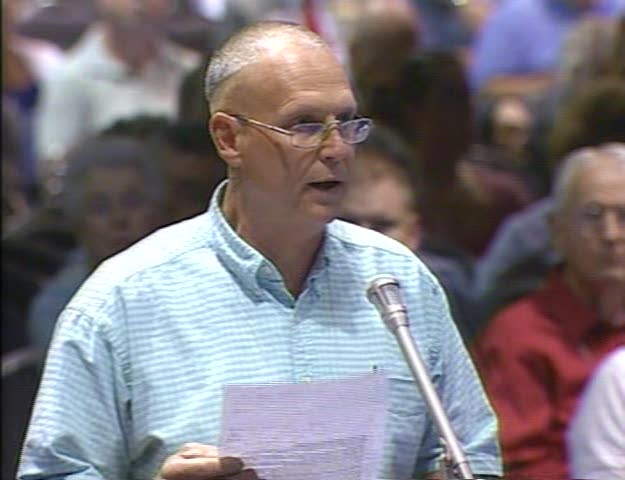
SAN ANTONIO (BP)–Messengers to the 2007 Southern Baptist Convention approved seven resolutions in the June 13 morning session, including one renouncing child abusers and churches that protect them.
One resolution still remained to be considered during the evening session. The vote on a resolution concerning global warming was delayed because messengers were closely divided on an amendment to the measure which ultimately required a ballot vote.
All of the resolutions approved in the morning gained unanimous or nearly unanimous approval. In addition to the child abuse resolution, messengers approved statements:
— urging Southern Baptist pastors to preach on “burning moral issues” and to lead congregations to influence the culture by presenting the Lord Jesus as the “only hope.”
— calling for Southern Baptists to repent individually and corporately that non-Christians might observe a “clear demonstration of His presence in our lives, churches, and denomination.”
— voicing opposition to hate crimes legislation that includes homosexuals and transgendered persons as protected classes and encouraging President Bush to veto any such bill that Congress passes.
— reaffirming the SBC’s repudiation of racism on the occasion of the 150th anniversary of the U.S. Supreme Court’s Dred Scott decision, which said blacks were not persons under the law.
— expressing thanks for the faithful support of the Cooperative Program, the SBC’s unified giving plan.
— thanking God and those in the San Antonio area and others who helped with the annual meeting.
All resolutions express the views of the messengers at a particular convention but are not binding on churches and the entities of the SBC.
The raised-ballot vote on the child abuse resolution appeared to be unanimous. In approving a strong statement, the messengers spoke clearly on an issue that has gained greater attention in the last year.
The resolution expressed a “deep level of moral outrage” at child abuse, repudiating those “who commit heinous acts against children” and “individuals, churches, or other religious bodies that cover up, ignore, or otherwise contribute to or condone” such abuse. It called on churches and SBC entities to respond in a “timely and forthright manner” to suspicions or charges of child abuse
The statement urged churches to conduct background checks on ministers, other employees and volunteers. It also recommended that churches use materials from Lifeway Christian Resources and other denominational entities to help protect children.
The resolution on hate crimes legislation urged Christians to love homosexuals and transgendered persons and to share the Gospel of Jesus with them. It also called on all Americans not to act hatefully or violently toward them.
The resolution also expressed “profound disappointment” in the U.S. House of Representatives’ passage this year of a hate crimes bill and asked the Senate not to approve it. It said such legislation could be applied in such a way as to threaten the free speech rights of those who are opposed to homosexuality on moral grounds.
A total of 33 resolutions were submitted to the Resolutions Committee prior to the annual meeting, in accord with SBC bylaws procedures. In some cases, more than one resolution was presented on the same topic. Among those not reported out to the convention by the committee were resolutions on the role of the Baptist Faith and Message, the SBC’s doctrinal statement; establishing and supporting Christian schools; private prayer language; the war in Iraq; capital punishment; political non-partisanship; and gluttony.
The longest debate of the morning resolution report came with an attempt by Tom Ascol, pastor of Grace Baptist Church in Cape Coral, Fla., to bring his resolution, titled “On Integrity in Church Membership,” to the convention floor. Ascol contrasted the 16 million-plus members reported by SBC churches with the about 6 million who attend church on an average Sunday. His resolution urged a reinstitution of church discipline that would raise expectations of what is required of church members.
Some messengers expressed concerns that the resolution would interfere with church autonomy, while others denied that charge and said membership totals should reflect reality more accurately. Messengers handily voted down the effort to bring the resolution up for consideration. It required a two-thirds majority.
The chairman of the Resolutions Committee is Gerald Harris, a member of Ephesus Baptist Church in Atlanta and editor of The Christian Index, the newsjournal of the Georgia Baptist Convention.
The other members of the committee are David George, member of First Baptist Church, Eagle River, Alaska, and director of missions of Chugach Baptist Association; Al Gilbert, pastor of Calvary Baptist Church, Winston-Salem, N.C.; Robin Hadaway, member of Pleasant Valley Baptist Church, Kansas City, Mo., and associate professor of missions at Midwestern Baptist Theological Seminary; Galen Jones, African American church planting strategist in Tuscaloosa, Ala., as an appointee of the North American Mission Board and Alabama Baptist State Board of Missions; Martha Lawley, member of First Southern Baptist Church, Worland, Wyo.; Michael Lewis, pastor of Great Hills Baptist Church, Austin, Texas; Daniel Sanchez, member of Wedgwood Baptist Church, Fort Worth, Texas, and director of Southwestern Baptist Theological Seminary’s Scarborough Institute for Church Planting and Growth; Charles Strickland, member of First Baptist Church, Vidalia, Ga., and executive assistant to the president at Brewton-Parker College in Mount Vernon, Ga.; and Greg Thornbury, member of Englewood Baptist Church, Jackson, Tenn., and dean of Union University’s school of Christian studies.
–30–

















